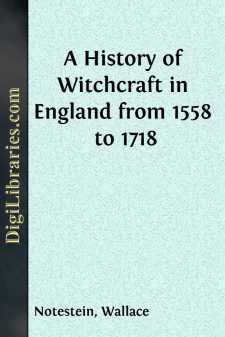Categories
- Antiques & Collectibles 13
- Architecture 36
- Art 48
- Bibles 22
- Biography & Autobiography 813
- Body, Mind & Spirit 142
- Business & Economics 28
- Children's Books 17
- Children's Fiction 14
- Computers 4
- Cooking 94
- Crafts & Hobbies 4
- Drama 346
- Education 46
- Family & Relationships 57
- Fiction 11829
- Games 19
- Gardening 17
- Health & Fitness 34
- History 1377
- House & Home 1
- Humor 147
- Juvenile Fiction 1873
- Juvenile Nonfiction 202
- Language Arts & Disciplines 88
- Law 16
- Literary Collections 686
- Literary Criticism 179
- Mathematics 13
- Medical 41
- Music 40
- Nature 179
- Non-Classifiable 1768
- Performing Arts 7
- Periodicals 1453
- Philosophy 64
- Photography 2
- Poetry 896
- Political Science 203
- Psychology 42
- Reference 154
- Religion 513
- Science 126
- Self-Help 84
- Social Science 81
- Sports & Recreation 34
- Study Aids 3
- Technology & Engineering 59
- Transportation 23
- Travel 463
- True Crime 29
A History of Witchcraft in England from 1558 to 1718
Description:
Excerpt
PREFACE.
In its original form this essay was the dissertation submitted for a doctorate in philosophy conferred by Yale University in 1908. When first projected it was the writer's purpose to take up the subject of English witchcraft under certain general political and social aspects. It was not long, however, before he began to feel that preliminary to such a treatment there was necessary a chronological survey of the witch trials. Those strange and tragic affairs were so closely involved with the politics, literature, and life of the seventeenth century that one is surprised to find how few of them have received accurate or complete record in history. It may be said, in fact, that few subjects have gathered about themselves so large concretions of misinformation as English witchcraft. This is largely, of course, because so little attention has been given to it by serious students of history. The mistakes and misunderstandings of contemporary writers and of the local historians have been handed down from county history to county history until many of them have crept into general works. For this reason it was determined to attempt a chronological treatment which would give a narrative history of the more significant trials along with some account of the progress of opinion. This plan has been adhered to somewhat strictly, sometimes not without regret upon the part of the writer. It is his hope later in a series of articles to deal with some of the more general phases of the subject, with such topics as the use of torture, the part of the physicians, the contagious nature of the witch alarms, the relation of Puritanism to persecution, the supposed influence of the Royal Society, the general causes for the gradual decline of the belief, and other like questions. It will be seen in the course of the narrative that some of these matters have been touched upon.
This study of witchcraft has been limited to a period of about one hundred and sixty years in English history. The year 1558 has been chosen as the starting point because almost immediately after the accession of Elizabeth there began the movement for a new law, a movement which resulted in the statute of 1563. With that statute the history of the persecution of witches gathers importance. The year 1718 has been selected as a concluding date because that year was marked by the publication of Francis Hutchinson's notable attack upon the belief. Hutchinson levelled a final and deadly blow at the dying superstition. Few men of intelligence dared after that avow any belief in the reality of witchcraft; it is probable that very few even secretly cherished such a belief. A complete history would of course include a full account both of the witch trials from Anglo-Saxon times to Elizabeth's accession and of the various witch-swimming incidents of the eighteenth century. The latter it has not seemed worth while here to consider. The former would involve an examination of all English sources from the earliest times and would mean a study of isolated and unrelated trials occurring at long intervals (at least, we have record only of such) and chiefly in church courts....


